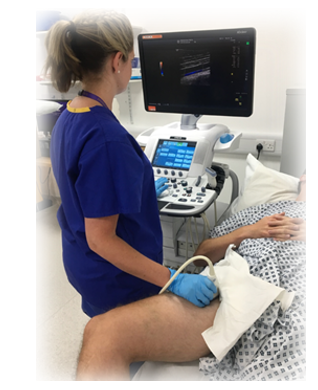
What is a bypass graft?
A bypass graft procedure is often performed to treat blockages in the arteries in your legs. It may also be performed if you have an aneurysm. This is when the walls of the artery get weak and expand.
A bypass is where a vein taken from another area in your leg, or a man-made graft is used to re-route the blood flow around the blockage or weakened artery walls.
What is an ultrasound scan of your bypass graft?
An ultrasound scan of your bypass graft may also be called a duplex or dopplers of your legs. This test uses ultrasound to produce images of the bypass graft in your leg.
It is a safe and effective way to assess the blood flow, and can determine whether the graft is working properly. If we find any problems with the graft, it allows the consultant to plan the best treatment.
The test is painless and does not use any radiation or needles. There are no risks associated with it.
Where do I go?
The Vascular Studies Unit (VSU) is on level 5 of the Addenbrooke’s Treatment Centre (ATC).
Please inform reception of your arrival straight away. There are often other clinics in progress so you may not be called in order of arrival.
You may bring a relative or friend in with you during the test or request a chaperone if you would like one.
What is consent?
Before your test is performed you must give your consent or permission. Consent is the process by which you give permission to health professionals to provide your care and treatment. It may be implied (offering your arm for a blood pressure reading) or formal (signing a formal consent form for an operation). In either case your consent must be given voluntarily and you must have all the information you need to make a decision. If you feel you do not have enough information or do not understand the procedure please ask
How do I prepare for the test?
The clinical vascular scientist may need to scan your abdomen. Therefore, it is helpful if you only eat a light meal prior to your appointment. This will help remove any excess bowel gas and can improve the test results. You can drink fluids as normal. If a medical condition requires you to eat regularly please do not restrict your food intake – it will still be possible to perform the scan.
How is an ultrasound scan of your bypass graft performed?
A clinical vascular scientist (who might be male or female) will perform and interpret your ultrasound scan. You will be asked to remove your shoes, socks and trousers or skirt. The lights will be dimmed to allow the best images to be obtained.
If possible, the scan will be performed with you lying down on the couch. Gel is applied to your skin and the scan is carried out from the groin down to the ankle. The ultrasound probe will be moved to view all of the arteries. In some patients, it may be necessary to extend the scan above the level of the groin into the abdomen. The scan takes approximately 30 to 60 minutes. During the test, you may hear some “swooshing” noises from the ultrasound machine. These sounds are normal.
What happens next?
The clinical vascular scientist can comment briefly on the findings and will write a report for the consultant who requested the test. You will be able to discuss the results of this investigation fully with the referring team at your next outpatient appointment.
In rare cases, the clinical vascular scientist may need to discuss the result with a doctor before you leave.
Contacts / further information
If you require further information, please do not hesitate to contact the Vascular Studies Unit (VSU) on telephone: 01223 348117.
Privacy and dignity
Same sex bays and bathrooms are offered in all wards except critical care and theatre recovery areas where the use of high-tech equipment and/or specialist one to one care is required.
We are smoke-free
Smoking is not allowed anywhere on the hospital campus. For advice and support in quitting, contact your GP or the free NHS stop smoking helpline on 0800 169 0 169.
Other formats
Help accessing this information in other formats is available. To find out more about the services we provide, please visit our patient information help page (see link below) or telephone 01223 256998. www.cuh.nhs.uk/contact-us/accessible-information/
Contact us
Cambridge University Hospitals
NHS Foundation Trust
Hills Road, Cambridge
CB2 0QQ
Telephone +44 (0)1223 245151
https://www.cuh.nhs.uk/contact-us/contact-enquiries/

